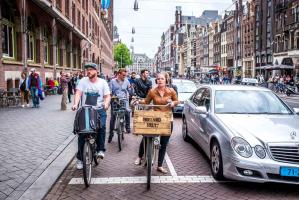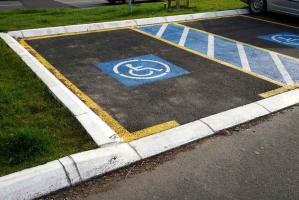Amsterdam bans creation of new hotels
Another piece in the overall strategy to reduce tourist flows to the city
 TheMayor.EU logo
TheMayor.EU logo The French capital has opted for grassroots democracy when it comes to making the tough decisions on mobility policy
4 February 2024 is the next important date on the Paris calendar – at least as far as mobility policy is concerned. This is when the French capital authorities decided to organize a referendum on whether to increase the parking price rates for sports utility vehicles (SUVs).
More specifically the question which will be put to voters to decide on is: “For or against the creation of a specific rate for the parking of heavy, bulky, polluting individual cars?”
The referendum is open to all registered voters living in Paris, who will be able to head to one of the 223 polling stations on that day in order to state their stance on the matter.
This is the second referendum on traffic (and public space) matters that the Parisian local government is organizing in less than 12 months. Back in April, the French capital made the news headlines by letting its residents decide whether they would like to ban publicly shared scooters from its streets (voters said ‘Yes’ to that).
The move made Paris an interesting example of participatory democracy in daily matters, but now this second referendum makes one wonder if this is setting up a regular pattern for the things to come in all matters of traffic policy.
What’s notable about the new polling is that the outcome doesn’t seem so radical, no matter what the voters decide. After all, SUVs face no threat of becoming extinct on the Parisian boulevards for the time being.
Nevertheless, the local authorities have proposed tripling the visitor (non-resident) parking rates for the largest type of private cars. This would mean for Arrondissements 1-11 these would become 18 euros per hour, and in Arrondissements 12-20: 12 euros per hour – if approved.
These financial obstacles could thus have a domino effect in putting a dent in the popularity of SUVs and 4x4s in France.
For three decades, the average size and weight of cars in the country have been increasing, taking up more and more space on the road, on sidewalks and in public spaces in general. In less than thirty years, cars have become heavier by almost 250 kilos. The average weight of a vehicle was 975 kg in 1990, today it is 1233 kg.
This is a problem because even if the number of private vehicles on the streets decreases the otherwise positive development is then offset by the growth in the size of the remaining cars. Thus, no environmental benefit is achieved as the larger cars are also more polluting.
It is now up to Parisians to decide which direction the fate of SUVs will go in their city.

Legislators and magnates have to await a preliminary ruling from the European Court of Justice

The building will then serve as the site for a new museum dedicated to Finnish-Russian relations

Another piece in the overall strategy to reduce tourist flows to the city

In addition, the federal government has launched the National Week of Action against Bicycle Theft to raise awareness of the issue and the new solution

The facility will replace the need to have water supplied by tankers from Valencia

Modern traffic lights do more than regulate the flow of vehicles at crossroads, they also collect enormous amounts of data

Experimenting with public transport provision in Germany is clearly in a state of creative fervour

Legislators and magnates have to await a preliminary ruling from the European Court of Justice

It also set the standards for a better European parking card for people with disabilities

The benefit will last until the Dutch parliament adopts the transgender law

Experimenting with public transport provision in Germany is clearly in a state of creative fervour

It also set the standards for a better European parking card for people with disabilities

Urban dwellers across the EU are having a say in making their surroundings friendlier to people and the environment.

Forests in the EU can help green the European construction industry and bolster a continent-wide push for architectural improvements.

Apply by 10 November and do your part for the transformation of European public spaces

Catch up with some recommendations for the 2024 European Capital of Culture programme from the mayor of Tartu

An interview with the ICLEI regional director for Europe аfter the close of COP28

An interview with a member of the No Hate Speech Network team













